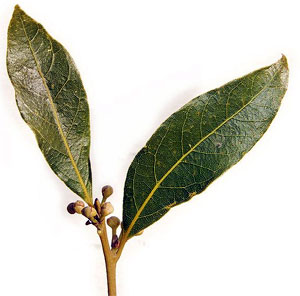Bay Leaf (Laurus nobilis)
 Bay leaves are used to impart flavor to all
kinds of meats, fish dishes, sauces, stocks and stews. The fruits are
also used, to a lesser extent, for similar purposes. The crushed leaves
are an essential ingredient in mixed pickling spices and are used on an
industrial scale in meat products, in making vinegar and in pastries. Bay leaves are used to impart flavor to all
kinds of meats, fish dishes, sauces, stocks and stews. The fruits are
also used, to a lesser extent, for similar purposes. The crushed leaves
are an essential ingredient in mixed pickling spices and are used on an
industrial scale in meat products, in making vinegar and in pastries.
The leaves are added early in the cooking as
the taste intensifies gradually. They should be removed from the dish
after cooking as they have sharp edges and can cause internal injuries
when ingested.
The laurel has a long history as a medicinal
plant. The leaves and berries are astringent, stomachic, stimulant and
narcotic. A decoction of the leaves is used to treat urinary problems
and dropsy and is said to be a powerful emmenagogue. The seed oil is
useful in treating rheumatic pains.
The essential oil of laurel leaves consists
of 140 components, with 1,8-cineole making up as much as 50%. The oil is
colorless and strongly aromatic with a warm, fresh and penetrating
camphor-like odor that resembles eucalyptus leaves. The flavor is
peppery, medicinal, and sweet and has a bitter aftertaste.
This aromatic tree can grow to a height of
15 meters. When in cultivation, it is usually pruned to a shrub of a few
meters tall. The trunk bark is blackish brown. The simple leaves are
arranged alternately along the branches and the leaf blades are
oblong-elliptical, rough to touch and have distinctive undulating
margins. The leaf blades are dark green above, pale green on the
underside and dotted with many tiny glands. Ten to 12 pairs of lateral
veins are visible on both sides of the leaves. A few yellowish green
flowers are clustered in an umbel and found in the axils of the leaf
stalk and the branch. The fruit, shaped like an olive, grows to 2 cm
long and is a glossy black when mature.
Fresh leaves are bitter while old dried
leaves are considered poor, so the best leaves are those that have been
dried for just a few days. Dried leaves purchased from the supermarket
should be kept sealed in a re-sealable plastic bag and placed in a cool,
dry place.
In classical Greece, wreaths made of laurel
leaves were used to honor heroes and poets. The words 'laureate' and 'baccalaureaus'
are derived from the word 'laurel'.

Happy Cooking,
Carol |

